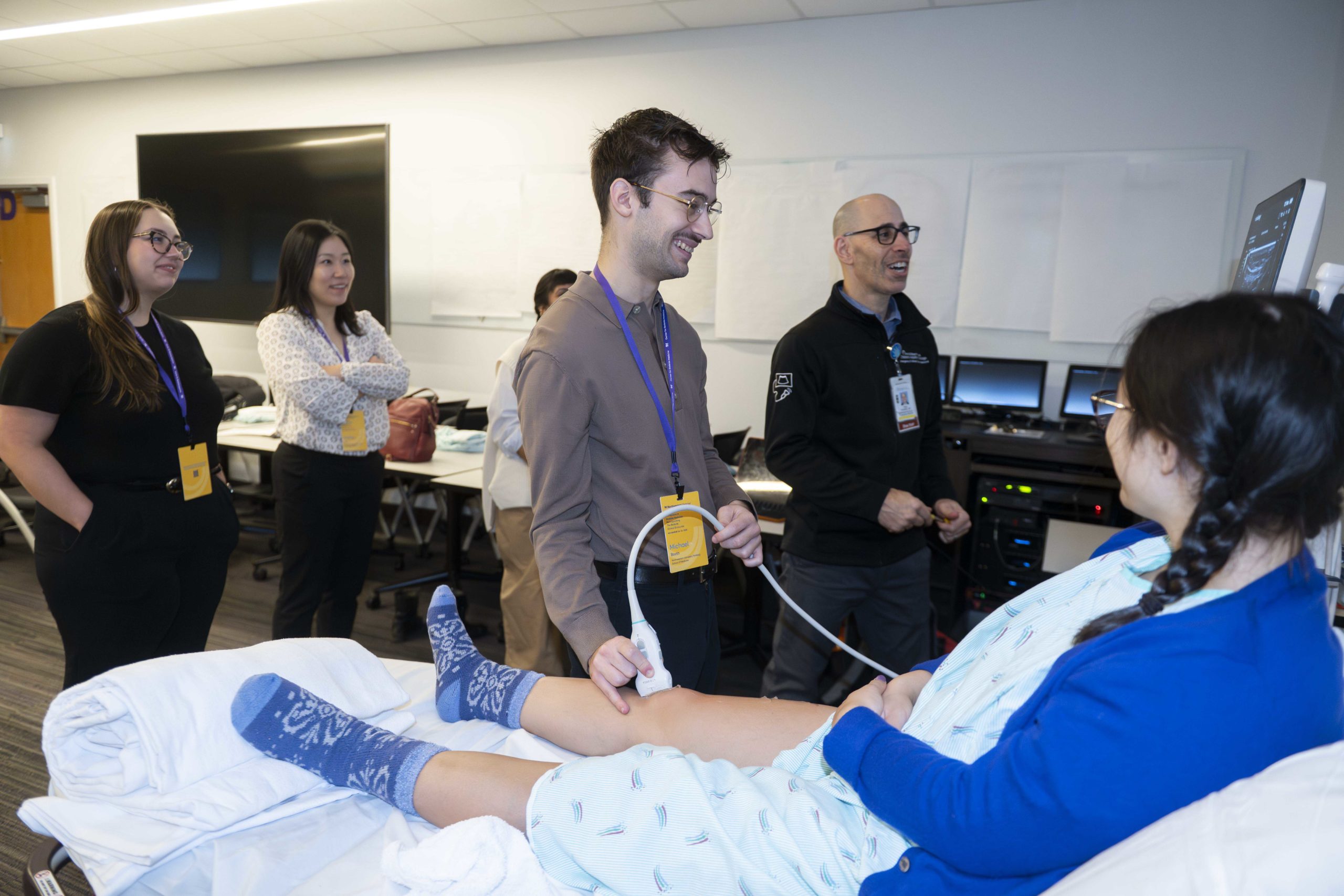-

Youth Opioid Overdoses Spiked During Pandemic, Study Finds
Youth opioid overdoses have risen since the pandemic, according to a study analyzing nationwide EMS encounters recently published in JAMA.
-

Bridging Generational Differences at Medical Education Day
Faculty, staff, trainees and students came together to share educational research and best teaching practices during Feinberg’s 14th annual Medical Education Day on October 15.
-

Understanding How Deadly Lung Cancers Control the Local Immune System
Northwestern Medicine scientists have discovered how a protein in a deadly type of lung cancer can control how the immune system responds to the tumor, according to a study published in the Proceedings of the National Academy of Sciences.
-

Improving the Science and Treatment of Glioblastoma
The average length of survival for glioblastoma has failed to improve since it was first identified in scientific literature nearly 100 years ago. Despite this, scientists at Feinberg remain steadfast in their commitment to improving the understanding and treatment of glioblastoma through rigorous research initiatives and clinical trials.
-

HIV Diagnosis Linked to Higher Risk of Meth Use in Gay and Bisexual Men
People assigned male at birth who belong to a sexual or gender minority group are twice as likely to use methamphetamine following an HIV diagnosis, according to a study published in the Proceedings of the National Academy of Sciences.
-

Medical Student Honored by Pisacano Leadership Foundation
Stephen Freeman, a fourth-year MD/MPH student at Feinberg, has been selected to participate in the Pisacano Scholars Leadership Program, a highly competitive professional development and scholarship opportunity given to exceptional future leaders in family medicine.
-

Novel Blood Test Predicts Risk of Severe Lung Disease
Northwestern Medicine investigators have created a novel blood test that identifies adults who may be at increased risk of developing severe respiratory illnesses, according to a recent study published in the American Journal of Respiratory and Critical Care Medicine.
-

Diversity and Inclusion Fall Lyceum Explores Causes of Health Inequity and Possible Solutions
Feinberg students, faculty, trainees and staff gathered in a packed Hughes Auditorium for the Office of Diversity and Inclusion’s annual Fall Lyceum on October 8.
-

Combination Therapy May Improve Treatment Response in Pancreatic Cancer
Northwestern Medicine investigators have discovered that a novel combination treatment promotes cancer cell death and tumor regression in mouse models of pancreatic cancer, providing a rationale for testing in future clinical trials, according to recent findings.
-

Targeting T-cell Lipid Metabolism May Improve Cancer Immunotherapy
Investigators have discovered that targeting specific mechanisms linked to lipid metabolism in immune cells within tumors may improve response to current and future cancer immunotherapies, according to a recent study published in the journal Immunity.
-

Northwestern Establishes New Center for Ataxia Research and Treatment
Northwestern has established the Denning Ataxia Center, a multidisciplinary hub dedicated to improving the understanding of ataxia through integrating leading-edge research with patient-centered clinical care, with the goal of unraveling the complexities of the condition and developing improved treatments.
-

Long COVID Patients With Abnormal Lung CT Scans Could Prove Key to Preventing Pulmonary Fibrosis
Northwestern Medicine scientists have determined which cells and molecules are responsible for radiographic abnormalities in long COVID patients, findings that could help inform future treatment options.
-

Virtual Palliative Care Outcomes Similar to In-Person, Study Finds
Patients receiving palliative care via telehealth report similar quality-of-life scores compared to those who had in-person care, according to a multicenter clinical trial recently published in JAMA.
-

Uncovering Regulatory Mechanisms of T-cells in Chronic Inflammation
Northwestern Medicine scientists have discovered a new underlying mechanism that controls a specialized group of T-cells, findings that may serve as potential targets for treating inflammatory diseases and cancer, according to a recent study.
-

Exploring the Elusive Genetic Causes of Rare Autoimmune Disease
A team of international scientists has uncovered the genetic underpinnings of a rare, inherited autoimmune disorder, according to a study recently published in Science Translational Medicine.
-

Gordon Delivers Nemmers Prize Keynote Lecture
Jeffrey Gordon, MD, a distinguished university professor at Washington University in St. Louis often referred to as the “father of microbiome research,” and recipient of the 2024 Mechthild Esser Nemmers Prize in Medical Science, visited Feinberg’s campus to deliver the keynote lecture on September 30.
-

Study Advocates for Alternative Biopsy Approach to Detecting Prostate Cancer
A new Northwestern Medicine study suggests using an alternative approach to prostate biopsy is as effective at detecting cancer as the current approach, but without the risk of infection or need for prophylactic antibiotics.
-

Improving Next-Generation Cancer Treatments
Northwestern Medicine scientists have developed a more effective method of delivering a cutting-edge cancer treatment, according to findings published in the journal ACS Nano.
-

Engineering Human Heart Tissue for Scientific Study
Northwestern Medicine scientists have developed a new way to measure heart contraction and electrical activity in engineered human heart tissues, according to findings published in Science Advances.
-

Medical Students Provide Heart Disease Prevention to Underserved Chicago Communities
Since 2013, Feinberg medical students have provided cardiovascular disease risk assessments and health counseling to underserved community members across Chicago through the Keep Your Heart Healthy program.






